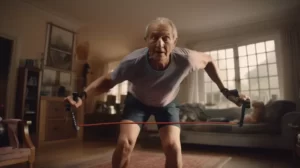Imagine living 30 percent longer and decreasing your chances of falling victim to a stroke or heart attack by simply staying active in your daily tasks. No rigorous exercise program required, just maintaining a general level of activity like gardening, doing your own car repairs, and fixing things around the house. This is precisely what researchers in Sweden have discovered—a simple, achievable, and effective way to boost life expectancy while reducing the risks of life-threatening health issues.
A Timeless Study
With people over 60 years old typically spending a higher proportion of time on everyday activities than other age groups, the researchers focused on studying the health of 4,000 60-year-olds for over a decade. As older individuals sometimes find it challenging to achieve recommended exercise intensity levels, this study’s findings prove essential in illustrating that older adults can still boost their life expectancy and overall health by remaining generally active.
During the study, the researchers found a direct link between heart attack and stroke risk reduction and regular daily activity. Those that were the most active experienced a significant 27 percent drop in the risk of experiencing a heart attack or stroke and a 30 percent decrease in the risk of death from any cause.
Finding Opportunities for Activity
Taking this information and putting it into action doesn’t have to be an overwhelming or time-consuming task. Adding activities to your daily routine that will increase your overall level of physical effort is remarkably simple.
Here are some ideas:
- Gardening: Pulling weeds, planting flowers, and doing yard work not only keeps you physically active but also exposes you to fresh air and sunlight, further enhancing your well-being.
- Car repairs: Instead of taking your car to the mechanic for minor fixes, consider doing them yourself. Changing a tire, replacing a battery, or changing belts on your car’s engine will keep you active and save you money.
- Home maintenance: Fixing things around the house, repainting a room, or even rearranging furniture can be excellent sources of activity that will engage your muscles and get your heart rate up.
- Walking: Incorporating a daily walk into your routine, whether it’s to the store, around the neighborhood, or at a local park, is an excellent way to stay active.
- Taking the stairs: Whenever possible, choose to take the stairs instead of elevators or escalators. This small decision can make a considerable difference in your overall activity levels.
Keeping Yourself Accountable
While it’s essential to recognize opportunities for activity, it’s equally important to hold yourself accountable for maintaining an active lifestyle. Make it a point to track your daily activities, whether in a journal or on a smartphone app, ensuring you’re sticking to your goals and remaining generally active.
Set realistic targets for yourself and focus on adding activity in a way that is enjoyable, sustainable, and compatible with your lifestyle. Remember, staying active and involved in routine tasks is not just about improving your physical health; staying mentally engaged and social is equally important in supporting a longer, healthier life. Connect with friends and neighbors while gardening, join walking clubs, or participate in community workshops to combine social interaction and mental stimulation with physical activity.
Finally, it’s important to consult with your healthcare provider when making changes to your daily routine. They will help you determine the best course of action based on your personal needs and medical history, ensuring that you enjoy the full benefits of maintaining an active lifestyle well into your golden years.
Finding an accessible way to stay active is within everyone’s reach, and the health benefits are undeniable. Don’t wait another day to start making small changes that can lead to a more fulfilling and longer life. Incorporate enjoyable activities into your daily life, hold yourself accountable, consult with your healthcare provider, and, most importantly, stay active in both body and mind.


![8 Simple Tips for a Longer, Happier Life [See Them Now]](https://naturalhealthreserve.com/wp-content/uploads/2024/01/8-healthy-tips-live-longer-slideshow-300x168.webp)
